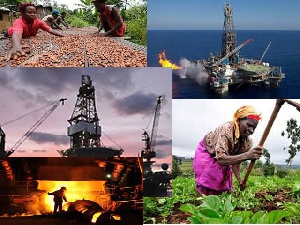The overall level of economic freedom in Ghana has grown higher than the country’s neighbours, says the 2016 Index of Economic Freedom released by Heritage Foundation at Institute of Economic Affairs.
The Washington-based organisation scored 186 countries across the world on four fundamental pillars covering open market, rule of law, regulatory efficiency and limited government.
There are 10 categories under the pillars, which include property rights, freedom from corruption, fiscal freedom, government spending, business freedom, labour freedom, monetary freedom, trade freedom, investment freedom, and financial freedom.
Ghana outperformed its neighbours like Togo, Burkina Faso and Cote d’Ivoire in the categories as the index showed the country progressed significantly well in all aspect of the four main pillars.
The country scored 63 in the latest economic freedom index whiles Liberia 52.2, Sierra Leone 52.3 and Cote d’Ivoire scored 60.
The improved performance of Ghana, he said: “Comes as no surprise as our neighbouring countries are riddled with either political instability or civil conflict.”
However, it performed woefully as compared to South Korea, Malaysia and Singapore, that had political independence in the same era as Ghana.
But some analysts said the West African country’s democratic evolution had been interspersed and frustrated by scores of military takeovers, until 1992 that saw the country make remarkable progress in ensuring rural of law.
“Just after independence in 1961, GDP [Gross Domestic Product] or per capita in Ghana was $ 190, whereas South Korea was a meagre $92.”
“Today as we speak, GDP/Capita for Ghana stands at $ 1,380 whereas South Korea is $27,222.”
Nigeria posted a gain of almost 2.0 points, but “the pace of job creation has been impeded by bureaucratic rigidity and corruption in the economy, leading to increasing frustration among underemployed youth,” the 484 page index said.
Meanwhile, South Africa, “is increasingly hampered by social instability exacerbated by frequent violent strikes and a lack of employment opportunity.”
The Heritage Foundation described economic freedom as the fundamental right of every person to control his or her own labour and property.
“In an economically free society, individuals are free to work, produce, consume, and invest in any way they please,” James Roberts, Research Fellow at Heritage Foundation, said during the presentation in Accra.
Mrs Karen Hendrickson, Director of Advocacy and Programmes, Heritage Foundation, said: “the performance of Ghana in the rankings implies that we have a long way to go to improve our economic freedom and to ensure economic development.”
“Overall, the index ranked Ghana as a “mostly free” country – meaning we can still do better.”
The Economic Freedom Index results provide compelling evidence that economic dynamism is best sustained when government institutionalise economic policies that empower individuals.
“When people have more choices, they are more likely to engage in entrepreneurial activity,” Hendrickson said, “in turn, it is an entrepreneurial activity that creates jobs, investment opportunities, and the new products and services that enrich our lives.”
The Freedom index is designed to show the close correspondence between economic freedom and entrepreneurial opportunity.
The discussion centred on the critical relationship between individuals and the government.
The index showed that state action or government control that interferes with the individual autonomy limits economic freedom.
Business News of Monday, 26 September 2016
Source: GNA
Ghana performs better than neighbours in economic freedom report
Entertainment











